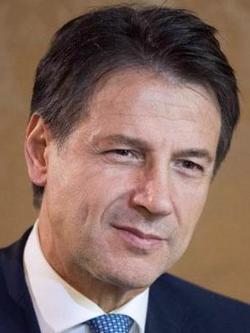
Giuseppe Conte (Italian pronunciation: [dʒuˈzɛppe ˈkonte]; born 8 August 1964) is an Italian jurist, academic, and politician who served as prime minister of Italy from June 2018 to February 2021. He has been the president of the Five Star Movement (M5S) since August 2021.
Conte spent the greater part of his career as a private law professor and was also a member of the Italian Bureau of Administrative Justice from 2013 to 2018. Following the 2018 Italian general election, he was proposed as the independent leader of a coalition government between the M5S and the League, despite his having never held any political position before. After both parties agreed on a programme of government, he was sworn in as prime minister on 1 June by President Sergio Mattarella, appointing the M5S and League leaders as his joint deputies. In August 2019, the League filed a motion of no confidence in the coalition government and Conte offered to resign as prime minister; the M5S and the Democratic Party agreed to form a new government, with Conte remaining at its head. This made Conte the first prime minister to lead two separate Italian governments made up of right-wing and left-wing coalition partners.
Despite having begun his political career as a technocrat, appointed to implement the government programme of M5S and the League, during the final months of his first cabinet and throughout his second one Conte became an increasingly influential and popular figure in Italian politics. During his premiership, he introduced important reforms including the introduction of a guaranteed minimum income, a constitutional reform to reduce the number of parliamentarians, nationalizations of ASPI (Italy's highway company), Alitalia (the Italian flag carrier), and Ilva (Italy's largest steel company), as well as a stricter policy towards illegal immigration. In 2020, Italy became one of the countries worst affected by the COVID-19 pandemic. His government was the first in the Western world to implement a national lockdown to stop the spread of the disease. Despite being widely approved by public opinion, the lockdown was also described as the largest suppression of constitutional rights in the history of the Italian Republic. Conte's extensive use of prime ministerial decrees to impose restrictions aimed at containing the pandemic gave rise to criticism from journalists, political analysts, and opposition politicians, even if it was widely appreciated by public opinion, as shown by several opinion polls. The economic impact of the COVID-19 pandemic was especially severe in Italy. In July 2020, to assist with the COVID-19 recession, Conte and other European leaders approved the Next Generation EU package, by which Italy will receive 209 billion euros in grants and loans from the European Recovery Fund.
When Matteo Renzi's Italia Viva withdrew its support for Conte's government, it started the 2021 Italian government crisis in January. Although Conte was able to win confidence votes in Parliament in the subsequent days, he chose to resign after failing to reach an absolute majority in the Senate. When negotiations to form Conte's third cabinet failed, the former president of the European Central Bank, Mario Draghi was asked to form a national unity government.
Conte was the fifth prime minister appointed without prior political experience, after Carlo Azeglio Ciampi, Silvio Berlusconi, Lamberto Dini, and Mario Monti, as well as the first from Southern Italy since Ciriaco De Mita in 1989. Conte was also the longest-serving independent prime minister in the history of Italy, even though he was widely seen as close to the M5S. Because of his leadership style, Conte has often been considered one of the leading examples of techno-populism, while his first cabinet was described by many publications, such as The New York Times and la Repubblica, as the "first modern populist government in Western Europe". Conte has often been called "the people's lawyer" (l'avvocato del popolo), as he described himself during his first speech as prime minister.
Source : Wikipedia